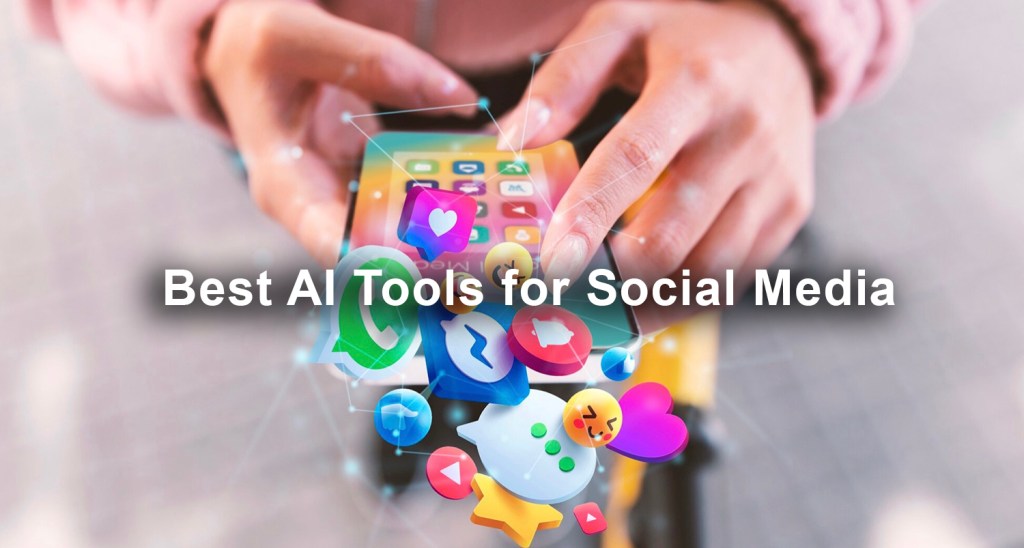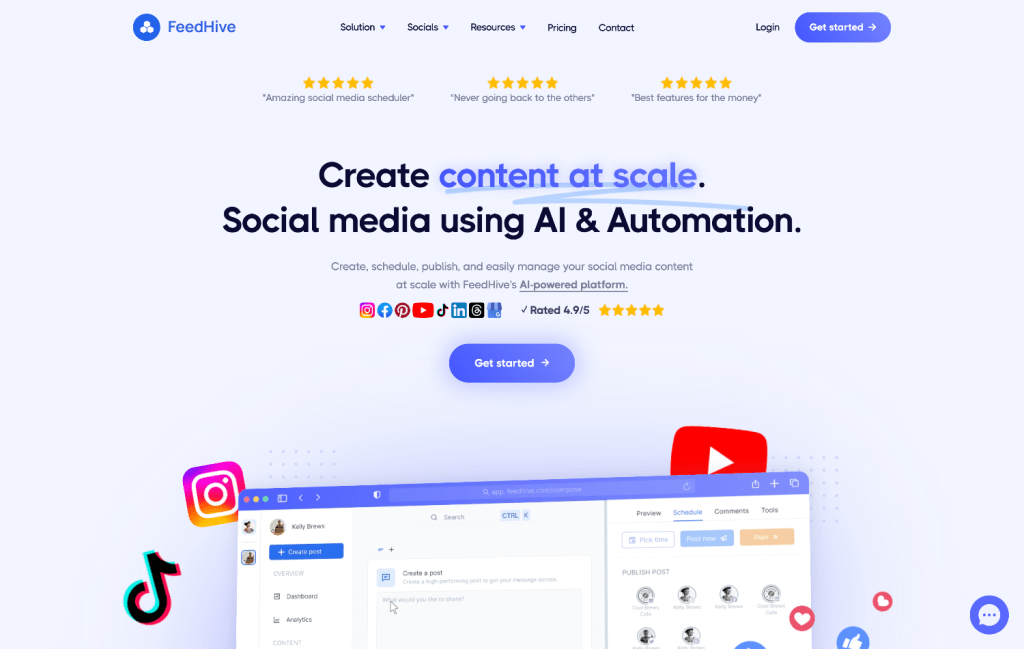Updated: Jan 02, 2024 By: Dessign Team

Social media management is a vital aspect of digital marketing and communication strategies. Various AI tools have been developed to enhance efficiency and effectiveness in this domain. Here's a brief overview of some of the best AI tools for social media:
1. FeedHive

FeedHive is an innovative social media tool that excels in post scheduling and AI-driven content generation. It's particularly useful for businesses and individuals seeking to maintain a consistent online presence.
The platform's strength lies in its ability to suggest and automate content, saving users significant time in content creation. However, users may find the customization options for posts and analytics somewhat limited, which could be a drawback for those requiring highly tailored content strategies.
Key Features: FeedHive specializes in social media post scheduling and analytics. It offers a unique AI-driven content generation feature that helps create engaging posts.
Pros: User-friendly interface, excellent for planning and automating social media content.
Cons: Limited customization options for posts and analytics.
2. Vista Social
Vista Social stands out for its comprehensive approach to social media management. It's an all-in-one platform offering scheduling, analytics, and engagement tracking across multiple social networks.
The tool is excellent for businesses needing in-depth analytics and multi-platform management. However, the wealth of features can be overwhelming for beginners or small businesses that might not require such extensive functionality.
Key Features: This tool is known for its comprehensive social media management capabilities, including scheduling, analytics, and engagement tracking.
Pros: Robust analytics features and ability to manage multiple social platforms.
Cons: Can be overwhelming for beginners due to its extensive feature set.
3. Buffer
Known for its user-friendly interface, Buffer simplifies social media management by allowing users to schedule posts, track their performance, and manage multiple accounts in one place. It's particularly suited for individuals and small businesses looking for an uncomplicated way to manage their social media presence.
While it offers a reliable performance tracking system, its analytics are somewhat basic, and the free version has limited features, which might be a drawback for some users.
Key Features: Buffer is popular for its streamlined approach to scheduling posts, tracking performance, and managing all social media accounts from one place.
Pros: Intuitive interface and reliable performance tracking.
Cons: Limited features in the free version and somewhat basic analytics.
4. Flick
Flick is a specialized tool primarily focusing on Instagram, offering unique features like hashtag analytics and strategy tools. It's ideal for influencers, marketers, and businesses that heavily rely on Instagram.
The tool excels in optimizing hashtag use, which is crucial for Instagram engagement. However, its utility is limited for other social media platforms, making it less versatile for those managing a broader social media presence.
Key Features: Flick is primarily focused on Instagram and offers hashtag analytics and strategy tools.
Pros: Great for Instagram-centric strategies and hashtag optimization.
Cons: Limited utility for platforms other than Instagram.
5. ContentStudio
ContentStudio is a robust tool for content discovery, planning, automation, and analytics. It caters to businesses and marketers needing an all-encompassing content management solution. The platform offers a wealth of features for discovering trending content, scheduling posts, and analyzing performance.
While it's comprehensive in its offerings, new users might find the learning curve slightly steep due to its extensive functionalities.
Key Features: ContentStudio offers content discovery, planning, automation, and analytics for various social media platforms.
Pros: Comprehensive tool for content management and discovery.
Cons: Slightly steep learning curve for new users.
6. Lately
Lately is unique in its approach, using AI to convert long-form content into bite-sized social media posts. This tool is particularly useful for content creators and businesses looking to repurpose existing content efficiently.
It saves significant time in content creation but focuses mainly on content conversion, offering less in terms of other social media management features like engagement tracking or detailed analytics.
Key Features: Lately uses AI to automatically turn long-form content into social media posts.
Pros: Efficient at repurposing content and saving time.
Cons: Mainly focuses on content conversion, less on other aspects of social media management.
7. Ocoya
Ocoya is a standout tool for its AI-driven content creation and marketing analytics. It's particularly adept at crafting visually appealing content and providing insightful analytics, making it a great choice for visually-focused brands and marketers.
However, while strong in content creation and analytics, Ocoya may not offer as comprehensive features in other areas such as post-scheduling, which might be a limitation for some users.
Key Features: Ocoya is known for its AI-driven content creation and marketing analytics.
Pros: Strong in creating visually appealing content and insightful analytics.
Cons: May not be as comprehensive in other areas like post-scheduling.
FAQ
What are the primary advantages of using AI tools for social media management?
AI tools for social media management offer several key advantages. They automate repetitive tasks like posting and scheduling, which saves time and increases efficiency. These tools also provide advanced analytics, helping users understand their audience better and optimize their content strategy. Additionally, some AI tools offer content generation and suggestion features, which can enhance creativity and engagement.
How do AI tools for social media differ from traditional social media management tools?
The main difference lies in the integration of artificial intelligence and machine learning capabilities. AI tools not only perform basic tasks like scheduling and analytics but also predict trends, suggest content, and personalize strategies based on user data. This results in more intelligent and adaptive management of social media platforms, as opposed to the more manual and static approach of traditional tools.
Are AI tools for social media management suitable for all types of businesses?
AI tools for social media management are versatile and can benefit a wide range of businesses, from small startups to large corporations. However, the suitability depends on the specific needs and scale of the business. Smaller businesses might require simpler tools with fewer features, while larger businesses may benefit from more comprehensive platforms that offer in-depth analytics and multi-platform management. It's important for each business to assess its unique needs and choose a tool that aligns with its social media strategy and goals.



